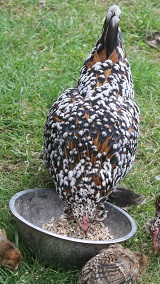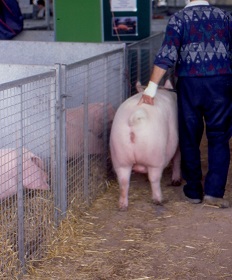Animal Protein Foods
 Proteins are complex organic compounds, found in every living cell. They are large molecules, built up from long chains of smaller amino acids. Proteins are composed of Carbon, Hydrogen, Oxygen, and Nitrogen. Phosphorus and sulphur are also commonly combined to form different proteins.
Proteins are complex organic compounds, found in every living cell. They are large molecules, built up from long chains of smaller amino acids. Proteins are composed of Carbon, Hydrogen, Oxygen, and Nitrogen. Phosphorus and sulphur are also commonly combined to form different proteins.
Proteins are species specific; proteins found in a cow for example are different to those found in a pig.
Protein is the basic building block of all body tissues. Muscle, skin, hair, bones and organs are all built up from different proteins. Many proteins are enzymes, which facilitate the chemical reactions that occur within every cell. Hormones, which are vital to each individual cell’s metabolism, are also proteins.
As mentioned proteins are made up of long chains of amino acids. There are about 23 distinct amino acids and these can be arranged in any number of combinations to form a variety of naturally occurring proteins. Amino acids are split up into two groups; essential amino acids and non-essential amino acids.
Essential amino acids cannot be synthesized within the body therefore are essential and must be provided within the diet. Non-essential amino acids are just as important but can usually be generated within the body from other amino acids or nitrogen. The amino acid combinations are species specific.
Animals rely on a constant source of protein throughout their lives for the maintenance, growth, and repair of damaged tissues. It is important for their:
- immune system,
- hormones,
- energy,
- regulation of their metabolism,
- part of the structure of cell walls and muscle fibre.
Protein provides strength with flexibility of ligaments, tendon and cartilage, and is involved in the transport and storage of oxygen, as well as being important in aiding in fertility for reproduction. Animals cannot synthesize all of the amino acids that they require to live, so they must gain them via outside sources. Due to the low protein values of pasture, ruminant animals need to eat large amounts of grass to gain all the amino acids that they need. Supplementary feeding is usually required. Non ruminant animals principally obtain protein from animal products e.g. milk, eggs and meat.
 Due to the size of protein molecules, they must be digested before they can be of any use to the animal. Protein digestion begins in the stomach by protein specific enzymes (proteases) and then carries on in the small intestine, before the molecules pass through the intestinal wall into the bloodstream.
Due to the size of protein molecules, they must be digested before they can be of any use to the animal. Protein digestion begins in the stomach by protein specific enzymes (proteases) and then carries on in the small intestine, before the molecules pass through the intestinal wall into the bloodstream.
Protein quality varies depending on the number and volume of essential amino acids they contain, and should closely resemble the species they are regarding. Protein quality measures in percentage and is referred to as its Biological Value. A protein level with a high biological value means that the molecules are highly digestible and leave fewer waste products that would need to be excreted from the body.
Although protein is important within an animal’s diet, they could also be fed an excess. This excess protein is broken down in the liver and some of it is excreted as urea from the kidneys and the rest of it is converted to glycogen and stored as fat. This would be damaging to animals with impaired liver and kidney function, causing these organs to work really hard to remove the protein from the body.
Signs of protein deficiency include weight loss, poor growth rates and a reduction in milk production.
Learn more with ACS
Learn about Animal Feed and Nutrition and much more with a wide range of courses from ACS - with courses from Introductory levels through to Advanced Diplomas, there is a level of learning to suit everyone.
Follow the links at the foot of this page to view all of our Agriculture courses.
If you have any questions or would like to know more - get in touch with us today. Phone us on (UK) 01384 442752 or (International) +44 (0) 1384 442752, or submit your questions to our expert tutors - they can help you in choosing which course to study and much more.
[17/02/2026 01:49:26]
More from ACS
Directory to dozens of courses include short courses, certificates and diplomas.